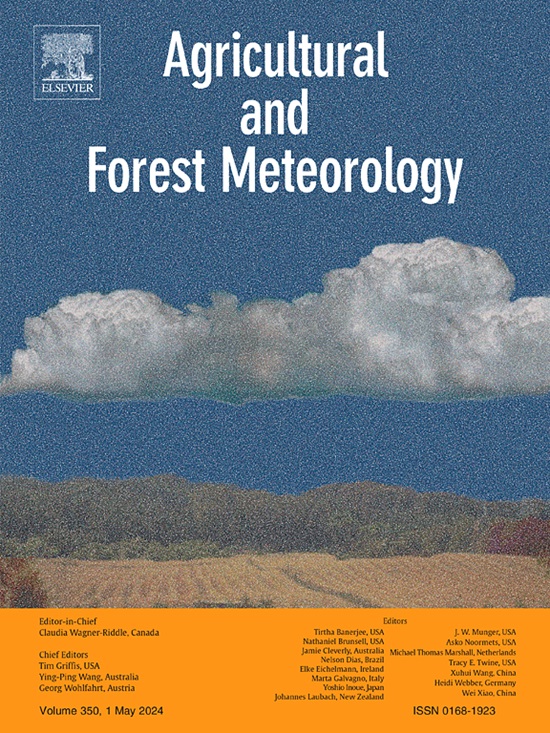Evaluating the sensitivity of vegetation indices to leaf area index variability at individual tree level using multispectral drone acquisitions
IF 5.6
1区 农林科学
Q1 AGRONOMY
引用次数: 0
Abstract
Vegetation indices (VIs) are widely applied to estimate leaf area index (LAI) for monitoring vegetation vigor and growth dynamics. However, the saturation issues in VIs caused by crown closure during the growing season pose significant challenges to the application of VIs in LAI estimation, particularly at the individual tree level. To address this, the feasibility of common VIs for LAI estimation at the individual tree level throughout the growing season was analyzed using data from digital hemispherical photography (DHP) and Unmanned Aerial Vehicle (UAV) acquisition. Additionally, the physical mechanisms underlying a generic VI-based estimation model were explored using the PROSAIL model and Global Sensitivity Analysis (GSA). Furthermore, the relationships between observed LAI derived from DHP and UAV-based VIs across different phenological development phases throughout the growing season were analyzed. The results suggested that the normalized difference vegetation index (NDVI) and its faster substitute infrared percentage vegetation index (IPVI) exhibited the best capabilities for LAI estimation (R2 = 0.55 and RMSE = 0.77 for both) across the entire growing season. The LAI-VI relationship varied seasonally due to the saturation issues on VIs, with R2 values increasing from the leaf budburst to the growing stage, decreasing during maturation, and rising again in the senescence stage. This indicated that seasonal effects induced by phenological changes should be considered when estimating LAI using VIs. Additionally, the saturation of VIs was influenced by soil background, leaf properties (especially leaf chlorophyll content [Cab] and dry matter content [Cm]), and canopy structures (especially average leaf inclination angle, ALA). Compared to satellites, UAV-based sensors were more effective at mitigating spectral saturation at fine-scale due to their finer spatial resolution and narrower bandwidth. The drone-based VIs used in this study provided reliable estimates and effectively described temporal variability in LAI, contributing to a better understanding of VI saturation effects.

求助全文
约1分钟内获得全文
求助全文
来源期刊
CiteScore
10.30
自引率
9.70%
发文量
415
审稿时长
69 days
期刊介绍:
Agricultural and Forest Meteorology is an international journal for the publication of original articles and reviews on the inter-relationship between meteorology, agriculture, forestry, and natural ecosystems. Emphasis is on basic and applied scientific research relevant to practical problems in the field of plant and soil sciences, ecology and biogeochemistry as affected by weather as well as climate variability and change. Theoretical models should be tested against experimental data. Articles must appeal to an international audience. Special issues devoted to single topics are also published.
Typical topics include canopy micrometeorology (e.g. canopy radiation transfer, turbulence near the ground, evapotranspiration, energy balance, fluxes of trace gases), micrometeorological instrumentation (e.g., sensors for trace gases, flux measurement instruments, radiation measurement techniques), aerobiology (e.g. the dispersion of pollen, spores, insects and pesticides), biometeorology (e.g. the effect of weather and climate on plant distribution, crop yield, water-use efficiency, and plant phenology), forest-fire/weather interactions, and feedbacks from vegetation to weather and the climate system.

 求助内容:
求助内容: 应助结果提醒方式:
应助结果提醒方式:


